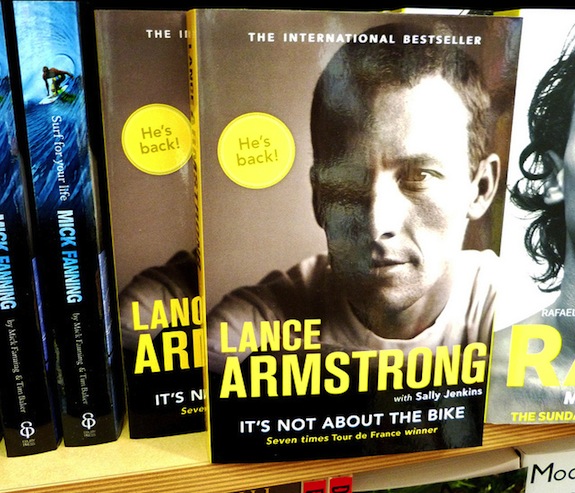Readers Who Bought Lance Armstrong’s Book Want Their Money Back
Lance Armstrong’s doping confession has cost him his Tour de France medals, sponsors and his charity. But now, readers who bought his books, want their money back too

Image: Leonard John Matthews
Lance Armstrong’s drug use has cost him a lot. His Tour de France medals have been taken away, his sponsors are backing away slowly, and he’s stepping down from his charity. Now, readers who bought his books want their money back, and they’re suing to get it. CNN reports:
The lawsuit, filed this week in federal court in California, also mentions Armstrong’s other book, “Every Second Counts,” and accuses the cyclist and his publishers of fraud and false advertising.
“Throughout the book, Defendant Armstrong repeatedly denies that he ever used banned substances before or during his professional cycling career,” the suit said.
Buyers, they say, bought the book as a work of non-fiction, when what Armstrong was really peddling was lies. And the lawsuit isn’t just asking for the price of the book back. The plaintiffs want “any statutorily permissible damages, attorneys’ fees, expenses and costs.” Not only would they have not bought the book, had they known about Armstrong’s doping, but they would have enjoyed it less, they argue. Which is worth some money. The Los Angeles Times writes:
The lawsuit says Stutzman, who was an aide to former Gov. Arnold Schwarzenegger, bought “It’s Not About the Bike” and “read it cover to cover.”
“Although Stutzman does not buy or read many books, he found Armstrong’s book incredibly compelling and recommended the book to several friends,” the suit says.
Wheeler is described in the filing as an avid cyclist who also bought Armstrong’s first book. He was “so impressed,” the court papers say, that he bought the athlete’s next book as well.
Here’s how Publisher’s Weekly summarized Armstrong’s first book, It’s Not About the Bike, is :
In 1996, young cycling phenom Armstrong discovered he had testicular cancer. In 1999, he won the Tour de France. Now he’s a grateful husband, a new fatherAand a memoirist: with pluck, humility and verve, this volume covers his early life, his rise through the endurance sport world and his medical difficulties. Cancer “was like being run off the road by a truck, and I’ve got the scars to prove it,” Armstrong declares…. “The real racing action was over in Europe”: after covering that, Armstrong and Jenkins (Men Will Be Boys, with Pat Summit, etc.) ascend to the scarier challenges of diagnoses and surgeries. As he gets worse, then better, Armstrong describes the affections of his racing friends and of the professionals who cared for him. Armstrong is honest and delightful on his relationship to wife Kristin (Kik), and goes into surprising detail about the technology that let them have a child.
The Amazon description of the follow-up, Every Second Counts, includes these inspiring lines:
His new book addresses the equally daunting challenge of living in the aftermath of this experience and making the most of every breath of life. Armstrong candidly discusses his prickly relationship with the French and the ultimately disproved accusations of doping within his Tour de France team, and he writes about his recent achievements, including celebrating five years of cancer survival and how he restored a magnificent chapel in his beloved Spain.
A fresh perspective on the spirit of survivors everywhere, Every Second Counts will invigorate and enthrall Armstrong’s millions of admirers.
Armstrong’s admission of doping certainly makes many wonder just how much of both of those stories is fact and how much is fiction. And the readers suing Armstrong don’t just feel deceived—they feel cheated.
In the past, publishers have refunded buyers for faked memoirs. When a memoir by Herman and Roma Rosenblat, two Holocaust survivors, turned out to be faked, publishers of a spinoff children’s version refunded their customers. The New York Times writes:
A children’s author, Laurie Friedman, was so inspired by an online news article she read about the Rosenblats that she wrote a children’s book based on his story. Lerner Publishing, the publisher of the book, “Angel Girl,” released in September, said Monday that it would not proceed with any reprints and would offer refunds for returned copies. The book has sold 2,000 copies so far, according to Nielsen BookScan, which tracks about 70 percent of sales.
When James Frey’s famously faked memoir A Million Little Pieces was found out, the publishers were sued by readers to the tune of $2.35 million. The Guardian wrote:
The total payout includes legal fees for the 12 plaintiffs from across the US who brought the case, as well as a donation to charity. And for the disgruntled readers it will not be simply a case of returning a receipt. The publisher wants to see hard evidence.
In the case of those who bought the US hardback edition for $23.95, readers must return both the receipt and page 163 of the book. Paperback readers must send in the front cover of the book to earn their $14.95 refund, while buyers of the audio book, which cost $34.95, must send in some of the packaging.
So Lance isn’t the first faker whose readers want their money back. And it’s possible that the publishers might just have to shell it out.
More from Smithsonian.com:
Is It Too Late To Forgive Lance Armstrong?
The Journalist Who Says ‘I Told You So’ About Lance Armstrong
Lance Armstrong Surrenders Against Doping Charges and Will be Banned for Life
/https://tf-cmsv2-smithsonianmag-media.s3.amazonaws.com/accounts/headshot/Rose-Eveleth-240.jpg)
/https://tf-cmsv2-smithsonianmag-media.s3.amazonaws.com/accounts/headshot/Rose-Eveleth-240.jpg)